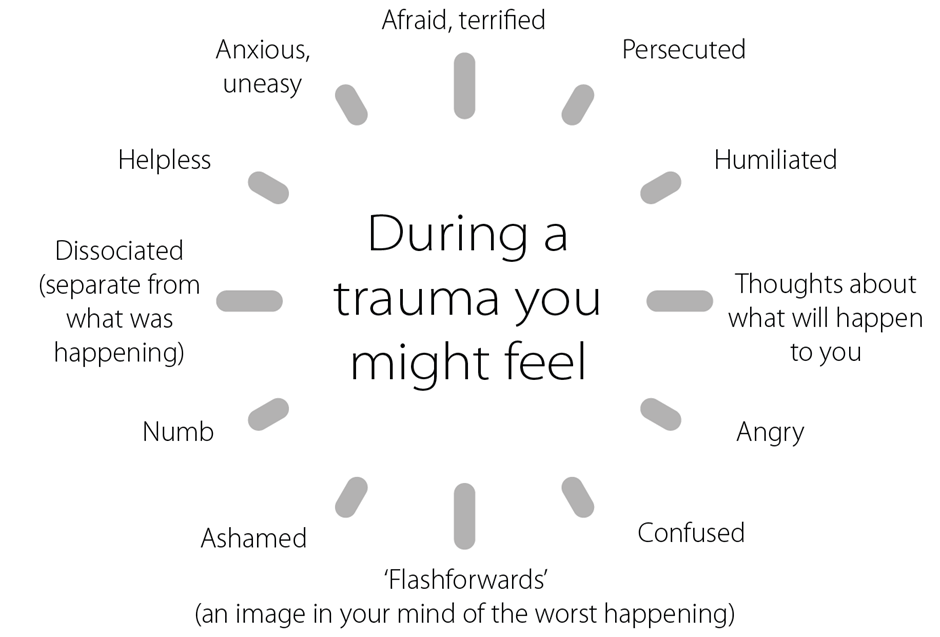Post-traumatic stress is an emotional response which may occur after a stressful event or experience. Some examples may include: an accident; sexual, physical or emotional abuse; and natural disasters.
Depending on the events, it may leave a person feeling a range of unpredictable emotions such as denial, anger, confusion, guilt, disconnected/numb, sadness, shame, anxiety/fear, and shock/disbelief.
One may also experience a sense of loss of security or safety; physical symptoms such as difficulty concentrating, nausea or headaches; flashbacks; nightmares; and strained relationships.
Source: psychologytools.com
Some of these are considered common responses following a stressful traumatic event; however, this becomes more concerning when these feelings or difficulties become prolonged (continues or worsens beyond one month after the event) and impact other areas of life (e.g., work, school, relationships).
Coping with trauma related difficulties
Movement & Exercise
Rhythmic exercises – walking, running, dancing.
Be mindful about your body and movements while exercising.
Connect with others
Surround yourself with those who make you feel loved, accepted and supported.
Meet new people, develop new friendships, and reconnect with old friends with whom you have healthy relationships.
Join in and engage in social events.
Ask for support
Engage with trusted family or friends – This does not always mean that you need to discuss your trauma if you do not wish to do so. It may just mean them accompanying you on a walk or helping with practical tasks.
Consider joining a trauma survivor support group.
Seek professional support.
Self-regulation techniques
Allow yourself to feel the feelings, acknowledge and accept them, then reorient yourself to the “here and now”, the present.
Deep breathing
Sensory regulation – create an environment which helps regulate and calm your sensory system. Use calming scents or sounds, ground yourself and connect with your surroundings of what you can see, or what you can touch.
Engage in activities/hobbies that you enjoy.
Sports, music, gardening, arts and crafts.
Self-care
Minimise stress
Prioritise yourself
Use a planner – keep the tasks in your day manageable, achievable, and balanced.
Maintain a good routine - Eat a well-balanced diet, drink enough water, and maintain a good routine around sleep.
Helping a loved one
Offer a non-judgemental listening ear should your loved one wish to talk.
Offer practical support – do the grocery run, school drop off/pick up, and help with housework or cooking.
Remain patient and understanding, and look after yourself too. It can be difficult to see a loved one go through the impacts of a traumatic experience. You may experience your own emotional response to this.
Encourage and assist your loved one with maintaining routines, engaging in activities of enjoyment, practicing and using self-regulation techniques, and taking care of themselves.
I hope this provides some simple strategies for improving overall wellbeing.
Teracia Sehgal
Psychologist
“Trauma- and Stressor-Related Disorders.” In Diagnostic and Statistical Manual of Mental Disorders. DSM Library. American Psychiatric Association, 2013. https://dsm.psychiatryonline.org/doi/full/10.1176/appi.books.9780890425596.dsm07
“NIMH » Helping Children and Adolescents Cope with Disasters and Other Traumatic Events: What Parents, Rescue Workers, and the Community Can Do.” Accessed October 27, 2021. https://www.nimh.nih.gov/health/publications/helping-children-and-adolescents-cope-with-disasters-and-other-traumatic-events
“The Effectiveness of Body-Oriented Psychotherapy: A Review of the Literature » PACJA.” Accessed October 29, 2021. https://pacja.org.au/2015/07/the-effectiveness-of-body-oriented-psychotherapy-a-review-of-the-literature/
Ley, Clemens, María Rato Barrio, and Andreas Koch. “‘In the Sport I Am Here’: Therapeutic Processes and Health Effects of Sport and Exercise on PTSD.” Qualitative Health Research 28, no. 3 (February 1, 2018): 491–507. https://doi.org/10.1177/1049732317744533
Hegberg, Nicole J., Jasmeet P. Hayes, and Scott M. Hayes. “Exercise Intervention in PTSD: A Narrative Review and Rationale for Implementation.” Frontiers in Psychiatry 10 (2019): 133. https://doi.org/10.3389/fpsyt.2019.00133






